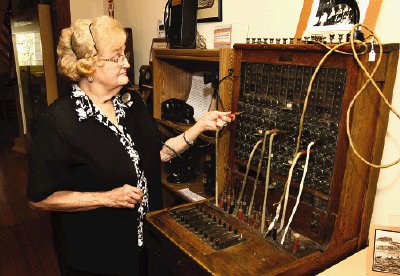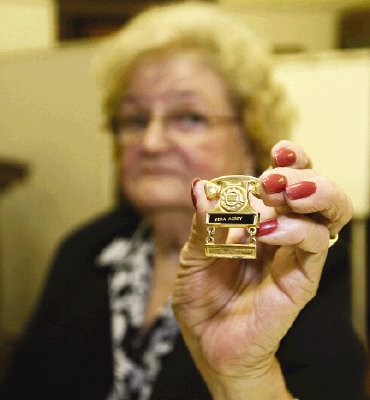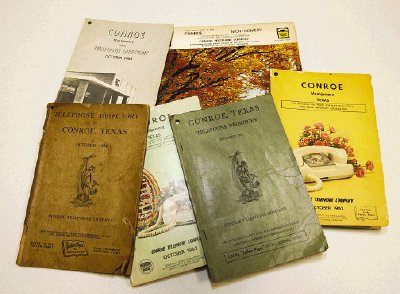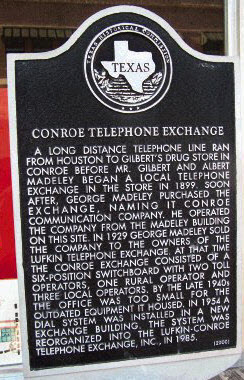|
With more than three decades
of service on the front
lines of the communications
industry, Vera Acrey has
seen amazing advances in
technology – but she’s not
so certain the world is a
better place for it all.
|
|
Acrey started her
communications career as a
telephone operator for the
Conroe Telephone Company
back in 1952 – years before
dial service was available
in Montgomery County. |
|
“I was
still a student at high
school,” said Acrey. “I
worked nights after school
and on weekends.” |
|
Prior
to joining the phone
company, Acrey worked at
Brownlee Pharmacy for 50
cents an hour, but she was
lured away by the promise of
98 cents an hour to work the
switchboard.
|
|
“I was
thrilled at the time and
remember thinking how much
more money I’d have,” said
Acrey. “I really enjoyed the
work.” |
|
Life
was simpler back in the 50s,
when the population of
Conroe was around 10,000,
Acrey observed. Crowds would
gather out front of the
Goodyear building in
downtown Conroe to watch to
television, she recalled.
Many would go to the
drugstore for sodas, shakes
and malts. |
|
Work
in the cramped offices of
the Madeley Building was
difficult, said Acrey. Her
boss, Morris Bateman, draped
a tarp over the back of the
switchboard to keep it dry
when it rained – often
sending a cascade of water
into the retail dress shop
below. |
|
Working alone at night was
also a challenge for the
young woman.
|
|
“I’d hear footsteps on the
stairs or noises in the
walls and get scared,” she
said. “Turns out there were
plenty of rats having a tea
party all around me.” |
|
To bolster her courage and
help her stay awake, Acrey
said she often called Calvin
Blake, night manager at
Hulon’s Gulf Service
Station. |
|
“It wasn’t that busy for
either of us at night so
we’d chat and keep each
other company,” said Acrey. |
|
Early phone service was
different that it is today.
Most customers in the Conroe
area had party lines with
two, four or as many as
eight houses on the same
line. Different rings would
alert customers who the call
was for – though it was
possible, and common, for
people to listen in on party
line calls by their
neighbors.
|
|
When business owners,
lawyers and doctors were
planning to step out of
their offices for a while,
they would ring the operator
and ask her to take messages
until they returned. |
|
“It was a very interesting
job,” said Acrey. “I got to
know a lot of people – and
an awful lot about a lot of
people.” |
|
The job lasted until late
1954 when dial service came
to the Conroe Telephone
Company and traditional
operators weren’t needed.
Rather than relocate to
Lufkin with the company,
Acrey elected to stay in
Conroe with her new husband
Bobby and raise a family. |
In 1962, Acrey was offered a
job in the business office –
handling directories,
assigning phone numbers and
collecting money from area
pay phones.
|
|
“I did
a wide range of jobs for the
phone company,” she said.
“Conroe was growing so fast
– it was a real struggle to
keep up.” |
|
But
keep up she did until
retirement in June of 1996.
After 35 years of service to
the company, she was given
her company chair at her
retirement party. |
|
“For
more than 20 years they kept
trying to get me to get a
new chair,” she laughed. “I
was happy with what I had
and didn’t want to change.” |
|
That’s
not far from Acrey’s
sentiment about the
evolution of modern phone
service. |
|
“Cell
phones and all the new
technology is wonderful,”
she said, “but it’s changed
the way people connect to
each other. They talk more,
but the connection isn’t
there.” |
|
Acrey
is concerned that the value
of spending time face to
face is being lost by
instantaneous, but often
meaningless texting and
instant communication. |
|
“Back
in the day you made a call
for a specific reason,” she
observed, “now people
constantly touching base for
no real reason. I think
we’re losing something.”
|

|
|
|
|
| The Courier July 22, 2012 | Home | Top of Page | Robert Acrey |
|
Vote Montgomery County TXGenWeb County of the Month
|
Montgomery County Texas Banner graphics were designed by and remain the property of Jean Huot Smoorenburg. If you are being charged to view/use any of this information or have questions or comments, please contact Jane Keppler. |
|
|
|
Copyright © 1997- present
- 2016 by
Jane Keppler.
This
information may be used by individuals for their own personal use,
libraries and genealogical societies. Commercial use of this information
is strictly prohibited without prior written
permission
from
Jane Keppler.
If material is copied, this copyright notice must appear with the
information and please email me and let me know.
Neither the Site Coordinators nor
the volunteers assume any responsibility for the information or material
given by the contributors or for errors of fact or judgment in material
that is published at this website. |
|
Page Modified: 18 October 2016 |





